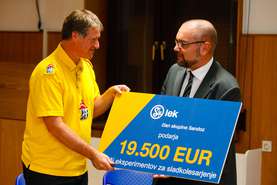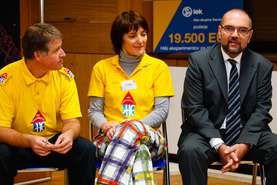With Lek’s support, more than 500 elementary school students ride against diabetes
If I eat one bag of chips I get enough energy for two hours of biking – so should I go riding or should I sit around and get fat?
Today the House of Experiments was visited by two groups of elementary school students, who “beat diabetes by biking” and learned in an interactive way how a healthy lifestyle and good food can reduce the likelihood of obesity and type 2 diabetes. “Diabiking”, which has been enjoyed by more than 500 elementary school students in the past two years, is made possible by Lek, a Sandoz company.
This Diabiking session was also one of the activities associated with World Diabetes Day, November 14, whose theme this year is prevention of and education about diabetes.
“Beating diabetes by biking”, or Diabiking for short, is a project developed by the House of Experiments in cooperation with Dr. Karin Kanc Hanžel, MD, a diabetes specialist with the jazindiabetes (diabetes and me) clinic. It is designed to teach children about diabetes, healthy eating and the problem of obesity in a way that they find interesting. The House of Experiments uses an interactive experiment called the Diabike, which they developed two years ago. Lek, a Sandoz company, recognized the great significance of the Diabike for raising children’s awareness about this disease, and decided to support it immediately.
The Diabiking session was also attended by President of the Lek Board of Management Vojmir Urlep, who presented the Director of the House of Experiments Miha Kos a check for €19,500. “Our work at Lek is based on knowledge, research and development in all areas of our operations. Knowledge has not only to be developed, but also transmitted to younger people, who have to be motivated to be curious, to try things and ask questions. And this is what happens at the House of Experiments. Diabiking is an activity with extremely important added value, so we at Lek decided to support it and make it possible for as many children as possible to “beat diabetes by biking”. Diabetes is extremely widespread in Slovenia, it is estimated that 136,000 people live with it, and these kinds of activities, which teach children about the importance of a healthy lifestyle, are very important,” said Urlep.
Learning by experiment is effective
The children that participate in Diabiking at the House of Experiments first take an anonymous test on diabetes using audio devices. This is followed by riding the Diabike and a conversation about nutrition, in which the children learn in an interesting way what food product labels tell them. While riding the Diabike they learn in a playful manner what the pancreas does, how insulin works, why we need sugar, what hypoglycemia is etc. Afterwards the children take the test again, which confirms the effectiveness of learning by experiment.
“According to our observations, learning through experience and play, such as Diabiking, is highly effective and is planted deep in the consciousness of each participant. This is demonstrated by the marked increase in correct answers on the diabetes test immediately after Diabiking. We are particularly pleased with the fact that they also preserve this knowledge for several months after Diabiking, which we also proved through testing. In this way we are building new generations that will not have prejudices about diabetes but at the same time will understand the building blocks of a healthy lifestyle: activity, eating a high-quality and varied diet in moderate amounts and lots of positive attitude,” said Dr. Karin Kanc Hanžel.


